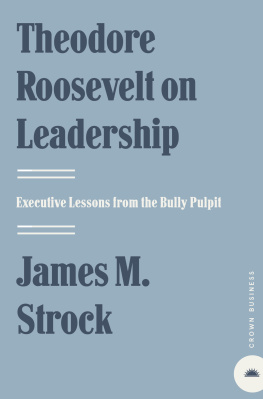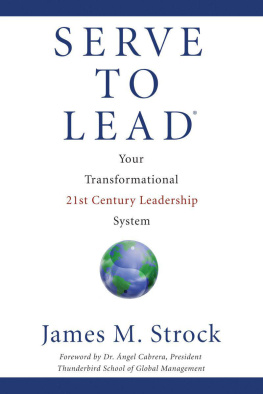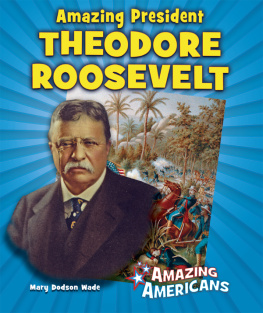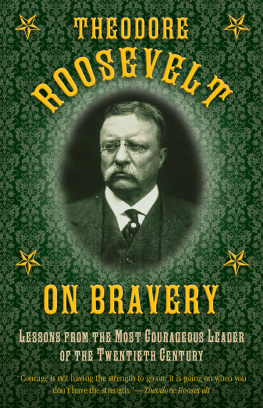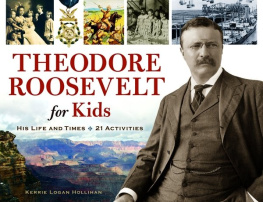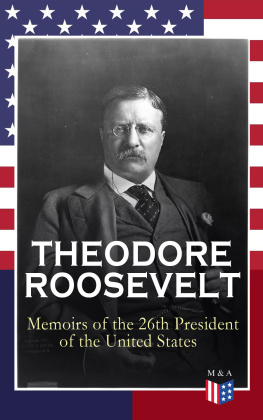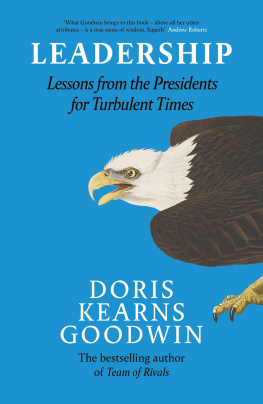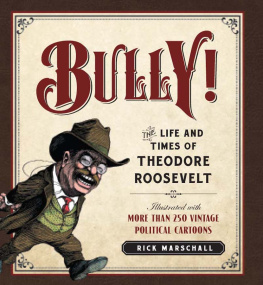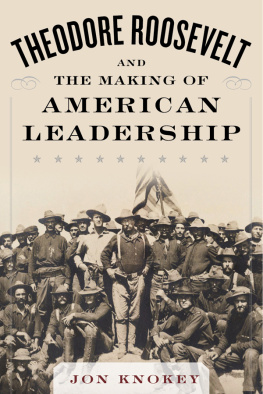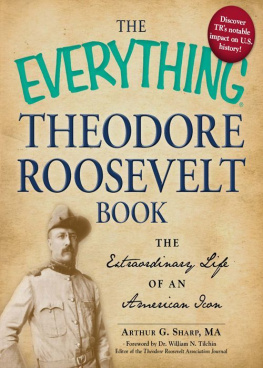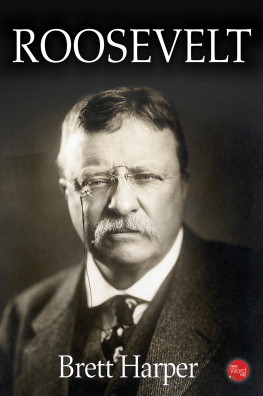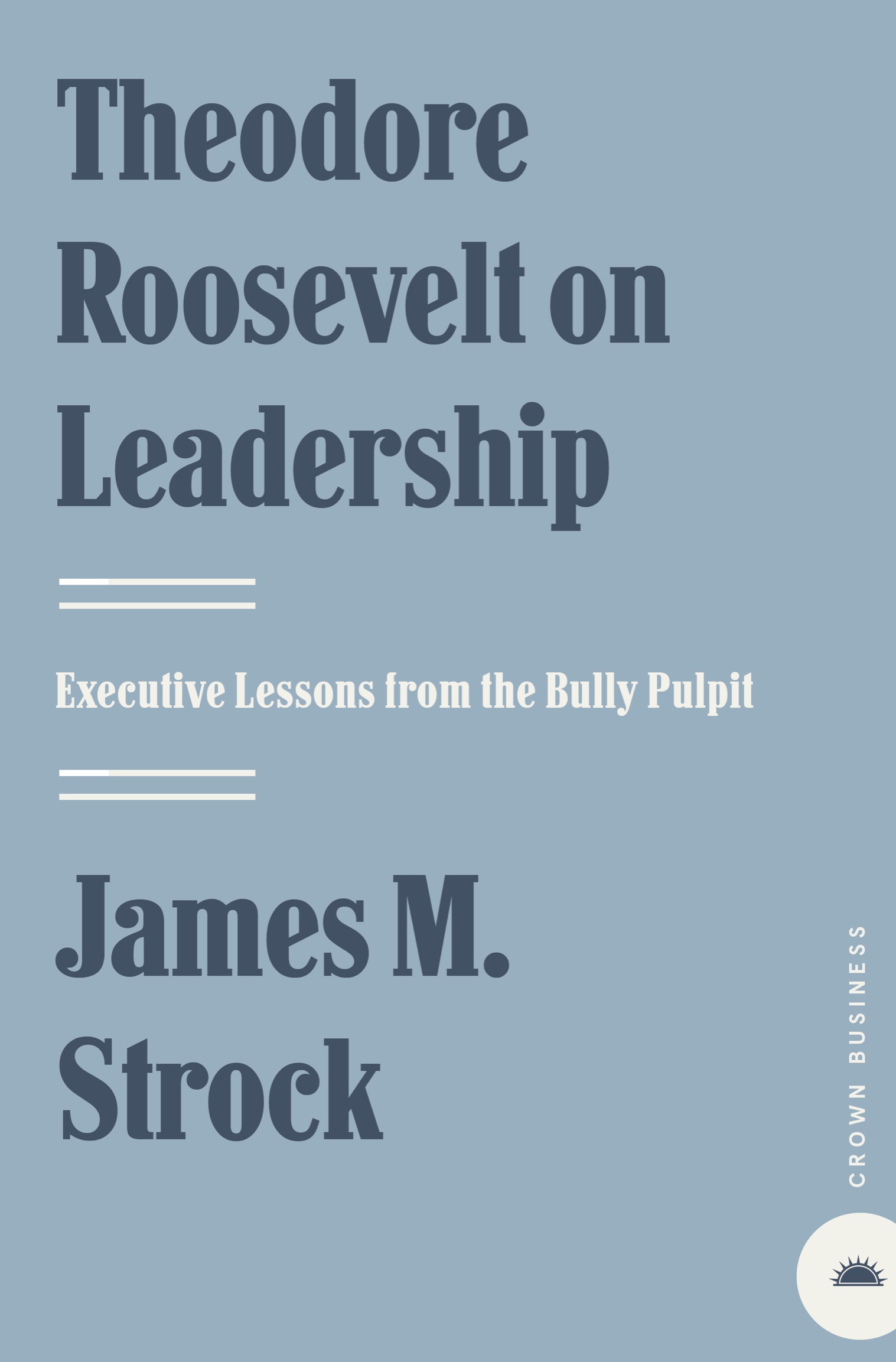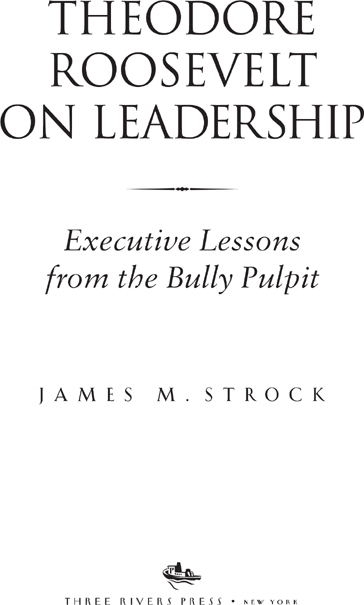More Praise for Theodore Roosevelt on Leadership
James Strock has written the book that Theodore Roosevelts admirers have been waiting fora clear, concise, and compelling account of TRs philosophy of living and working. This is a book that you will want to read and re-read.
John Allen Gable, Ph.D.,
executive director, Theodore Roosevelt Association
As rousing and inspirational as its protean subject, Theodore Roosevelt on Leadership is ideally timednot only to coincide with the centennial of Americas first modern president, but to combat the cynicism and artifice that beset our culture. In mining TRs life for the gold of individual character and national purpose, James Strock gives us a memorable portrait of an unforgettable American.
Richard Norton Smith,
presidential historian
This captivating volume is a must-read for people in business, the nonprofit sector, and government who cannot achieve their goals without inspiring others.
Carla A. Hills,
chair and CEO of Hills & Company,
International Consultants; former U.S. Trade Representative
and U.S. Secretary of Housing and Urban Development
James Strocks incredible account of Theodore Roosevelts inspirational and strategic leadership of our country will become a primer for todays business and governmental executive in sustaining our global economy. His knowledge and interpretation of TRs strength, courage, and vision is unsurpassed. I thoroughly recommend this as required reading for both the aspiring manager and the seasoned executive.
Carl D. Perry,
president and CEO, Enova Systems Inc.
I highly recommend this insightful account of the leadership philosophies that defined a truly extraordinary leader and one of our most dynamic (and sometimes controversial) presidents. An exhilarating read for every executive and aspiring top executivemade particularly interesting by illustrative, fascinating vignettes from TRs life.
Malcolm R. Currie,
chairman and CEO (ret.), Hughes Aircraft Co.
In a time when perception is regarded as reality, it is nice to be reminded of the real thing. TR didnt know about spin or use phrases like maximizing goals. Common sense and tenacity, combined with the leadership principles illustrated in this inspiring book, are timeless and irresistible.
John Milius,
Hollywood writer and director
No one exemplified management ability more than Theodore Roosevelt, the greatest executive of his era, whose extraordinary leadership talents are so well documented in James Strocks book. Theodore Roosevelt on Leadership is an outstanding reference manual for rising leaders.
Putney Westerfield,
chairman emeritus, Boyden International;
former publisher, Fortune
The values and principles that made Theodore Roosevelt such a great leader are as relevant today as they were during his lifetime. In this very readable book, James Strock shows readers how they can apply TRs remarkable leadership qualities to their own lives and careers.
George Montgomery,
investment banker and trustee of Environmental Defense
James Strock has done a masterful job of drawing strategic leadership lessons from the life of TR and serving them up to readers for productive application in their businesses and their lives. TRs leadership has never been more relevant than in todays white-knuckle business arena. The timing for this work is perfect!
Dave Anderson,
president, LearntoLead.com
CONTENTS
PART 1
Chapter 1
Chapter 2
Chapter 3
Chapter 4
Chapter 5
Chapter 6
PART 2
Chapter 7
Chapter 8
Chapter 9
PART 3
Chapter 10
Chapter 11
Chapter 12
Chapter 13
Prologue:
September 1901
T HE DAWN OF the twentieth century was a time for the United States to take stock.
The American Experiment was remarkably new. The national government, which was the boldest attempt to establish a republican democracy in history, had been established just over a hundred years before. The bloody Civil War that roiled the nation between 1861 and 1865 left lingering legacies, still felt keenly in American life at the turn of the twentieth century.
The nineteenth century had been a time of unmatched change. The United StatesLincolns calculated use of the singular was becoming more comfortably customary with the passage of timewas hurtling headlong toward its destiny. In 1800 the nation encompassed 13 states and 5 million Americans; by 1900 it had expanded inexorably westward, with 45 states and 76 million people.
It is not surprising that the New YorkTimes declared, on January 1, 1900, that the twentieth century would bring a brighter dawn of civilization.
Perhaps no group was more keenly aware of the progress than those older Americans whose lives spanned virtually the entirety of American history. In Philadelphia, Elizabeth Cooper McIntyre was ninety-nine years old in 1900, having been born in the year that President John Adams led the move of the capital from Philadelphia to Washington, D.C. In the words of Judy Crichton:
[Mrs. McIntyre] could remember when there were no fireboxes or friction matches, no postage stamps or envelopes, when communication was as slow as it was uncertain and signaling was done from town to town by means of fires on mountaintops or waving flags. In her youth it had taken six weeks to get news from Europe; now it took six seconds. Mrs. McIntyre had seen the coming of the cable, the telegraph and telephone, trolleys and high-speed trains. Many Americans now had ice in the summer and heat in the winter and artificial lightkerosene, gas, or electricwhich could be summoned any time of night or day. There were modern coal stoves and bathtubs with running water and water closets that flushed waste away.
The Indianapolis Journal noted on January 7, 1900: No single feature of nineteenth-century progress has been more remarkable or more significant of advancing civilization than the improvement in the condition of the working classes. The writer added that in 1800, slavery existed not only in the United States but also in the West Indies and South America. Readers likely needed no reminder that this evil institution had been eradicated a mere generation before in the United States, only in 1888 in Brazil, and that it functioned in full force in other parts of the world of 1900.
As everyday Americans celebrated the dramatic progress in their midst, from a distance other nations watched the United States unmistakably emerging onto the world stage. Only Russia and Canada swept across larger land areas. Among Western nations, only Russia had a larger population. At the time of Queen Victorias death in January 1901 the British Empire was at its zenith, asserting jurisdiction over approximately one-quarter of the earths population (400 million people out of 1.6 billion estimated total) and land mass. London was the worlds most important city. The incomparable British naval fleet implicitly stood watch over its rambunctious offspring, giving America time in which to grow, largely unmolested amidst the machinations of great power politics.

